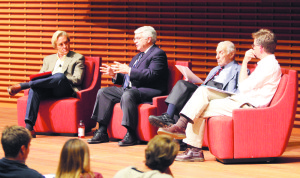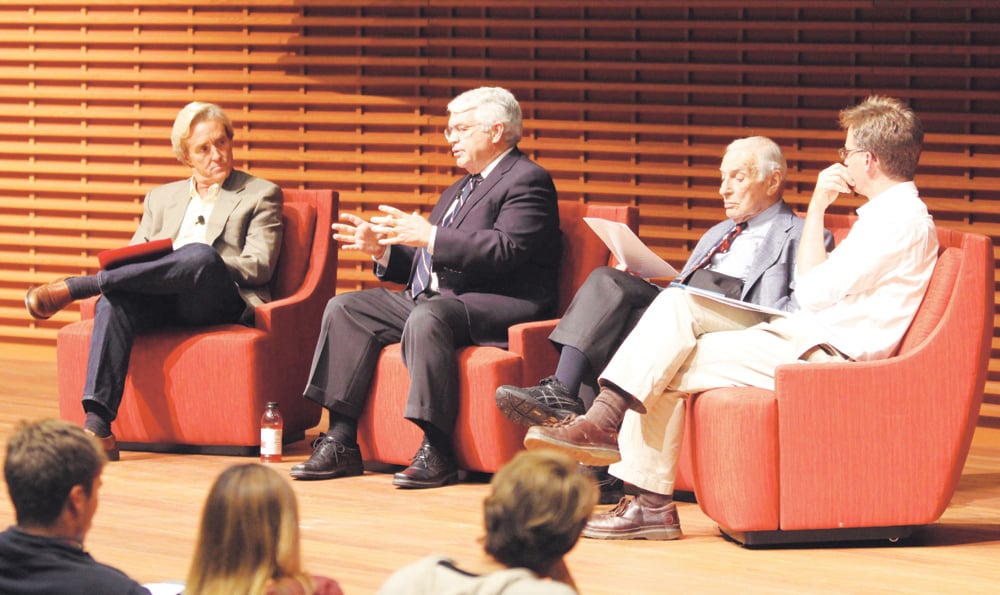Every Tuesday night leading up to the Nov. 6 presidential election, Cemex Auditorium was packed with a mixed student population of undergraduate, graduate and continuing studies students. The course’s 600-plus students listened to panels of policymakers and academics discussing the presidential election, with discussions moving online through Piazza and class sessions being broadcast using iTunes U.

Looking back on the first elections class of its kind at Stanford, course lecturers David Kennedy, professor of history, Rob Reich and Jim Steyer, professors of political science, and students agree the class was innovative but far from perfect.
POLISCI 51K was open to enrolment for continuing studies students, giving the class more diversity than almost all other Stanford classes.
“I think it added a great component in that it really allowed for a great range of perspective around our democracy and our election,” said Laura Phelps, a continuing studies student.
“You never really get that much exposure to adults and adult conversation in Stanford classes,” said Maxine Litre ’13. “[The more diverse student body] was able to speak about the sentiment of past elections the way none of us could.”
Brianna Pang ’13 agreed that the mixed student composition added a wider range of perspectives.
“If you’re only taking classes with people who are around your age, you tend to have kind of the same thoughts,” she said. “I think with the older population there, they have more experience and just have different ideas because they’re at a different stage of life, so it sparked more discussion.”
Unfortunately, dialogue between continuing studies students and undergraduates could not continue online.
“I was eager to try to facilitate cross-generational political conversations or debate,” Reich said. “People sat in the same room together, but we couldn’t put them in the same discussion forum for legal reasons, apparently.”
University lawyers advised Reich that putting continuing studies students and undergraduates in the same forum could breach privacy laws. By the time Reich was informed of this problem, it was too late to find other ways to have all students in the same online forum, like having everyone sign a waiver.
Legal issues also prevented some classroom discussion. Because of the class’s presence online, all students would have had to sign a waiver if one spoke and was captured on camera or recorded.
“I think [student diversity] was a big plus, but a lot of the value of that arrangement was compromised by our inability to have wide classroom discussion,” Kennedy said. “So that’s another way that I regret we couldn’t take questions from the floor and provide for more interaction in the room.”
Students and professors also had mixed reactions to the course’s use of Piazza. Many students felt that the online discussion forum allowed for fascinating, engaging dialogue, but the program was far from perfect.
“The online system, I think, added a much fuller class and full participation despite it being so overwhelming in numbers,” Phelps said.
Through Piazza, students posted questions before class, helping speakers address important points and opening up questions to a broader group of students.
“Online forums can be really good for facilitating the interaction and contribution of students who are a little less inclined to jump into conversations in person,” Reich said.
However, despite the great opportunity Piazza provided for class discussion, it left some students feeling dissatisfied. Along with other students, George Saba ’15 found difficulty navigating the interface.
“It wasn’t the most clear program, I thought, because there were so many different topics to choose from,” he said. Piazza also deactivated the “upvote” function, a button that allowed users to vote on the best comments or questions, partway through the course.
Reich noted the nature of online course-hosting software tends to be more useful for science and technology fields: For example, Piazza’s interface had radio buttons to click on when the correct answer has been found despite the fact that political discussion does not always have a right answer.
“It served to confirm a worry that I had that a lot of what exists in online learning has been built with the subject matter of engineering or math or computer science in mind,” he said. “The humanities and social sciences have been neglected…Clearly there’s a need for an open-ended discussion board.”
